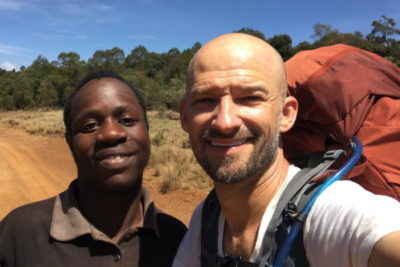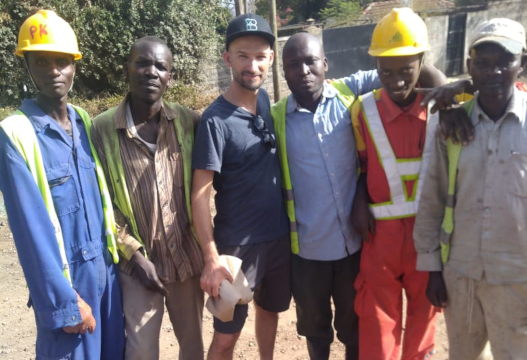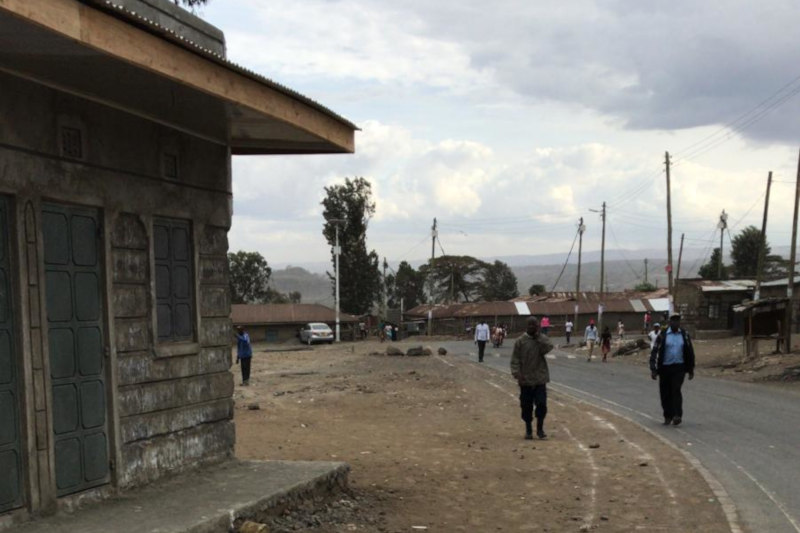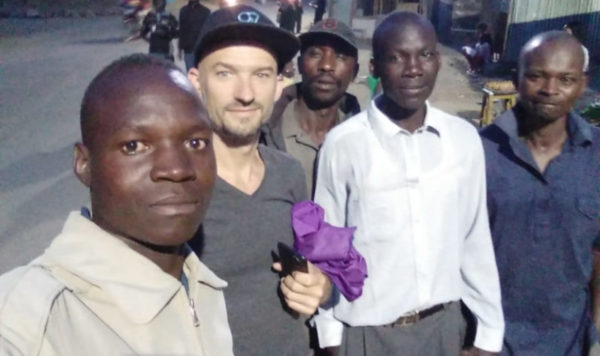On Sunday, I walked six kilometers from my home to one of Nakuru’s slums. I had been invited to facilitate a men’s group here, in a part of town I’d never been. And by the looks of the people who stared as I walked, not many people like me venture to this part of town.
I’ve walked hundreds of kilometers since I’ve been in Kenya – it gives me the chance to see things I otherwise would never get to see. I see how the size of the ants change based on elevation and where hyenas hide; the changes in grass color, moisture in the air, the color of the soil and the species of plants.

And I get to meet people, share stories and hear theirs. When I was walking in the lands between Lake Olbolosat and the Aberdare Mountains, a young man ran to catch up to me. He said he’d never seen a white person who wasn’t in a tourist Jeep. I’m the first muzungu he’d ever spoken to. He walked with me for an hour.
Last week, I was walking past a road construction site, when a street worker called out to me in English, “How are you?” Curious children and men yell that at me all the time.
I answered, “Vizuri sana, asante!”
They wanted to know why I spoke Swahili, where I had learned it, where I was going and where I am from. They wanted to know about this crazy mazungu who walks and engages in their native tongue.
They wanted to know what I think of Kenya. They wanted to tell me what they think of Kenya.
Mostly, I hear that the situation in Kenya is difficult. Corruption, lack of work and opportunity, to name a few. It’s easy to look outside and all around for the cause and solution to the problems when so many clearly abound.
So, I started posing these questions:

“What can WE do?”
“In what ways are our own structures of knowing, thinking… and then acting, that are contributing to and aiding the problems?”
We all have a tendency to be proud of our heritage, but in what ways are our old customs and beliefs perpetuating current problems? In what ways are we a part of the same problems we’re trying to buck?
Here in Kenya, two equally strong forces press down on the men. First are the traditional tribal customs to be a powerful patriarch. Second, they have adopted a Bible that tells men to be the head of the house, to have the answers and to be strong. Both of these leave men unable to be honest (and say “I don’t have the answers”). If they struggle this much, they must be failing, and are forced them to carry the burden of their perceived personal failure as men, with no way out.
They don’t have the answers, but everything in the world tells them they should!
It is all too easy to see how our patriarchal system oppresses women. Less obvious, but also insidious, is how it affects men. When I asked them, “Who is more likely to be a thief, a man or a woman?”
As if in unison, they answered: “Men.”
“How about a murder? A rapist? A corrupt politician? A drunkard?”
“Men.”
When they asked me if “Walking all over Kenya and sleeping in a tent is dangerous,” was it because of men or women?
“Men.”
Then, as men, we must accept responsibility for these problems. We can’t just say, “it’s other men, it’s not me.”

I can’t change any other man’s behavior, so I had better work on mine. I’d better look at where my assumptions and ways of thinking are perpetuating unhealth.
“If you were to commit any of those crimes, would you be happy?”
Look around! Men make more money, we’re never told to “go back to the kitchen,” we don’t bleed from our privates every month and we can walk home safely after dark (which no woman can do here in Kenya).
Yet we’re unhappy.
In fact, we’ve raised an entire world population of unhappy and unfulfilled men and we’re paying the price in our suffering world.
“Why is that?”
They had to get back to building the road and I needed to go grocery shopping. They asked me if I would be their teacher.
I was a little uncomfortable with the question – “who am I to do this?”
I offered to be a facilitator of conversation and discovery. “Find a place where we can meet, and invite no more than 15 men, and I’ll facilitate a men’s group.”
A few days later, we opened our men’s group with a few rules. Some were easy to understand and implement, like “What happens in this room stays in this room.” Some would be terribly foreign, like “Failure is a win”, “Vulnerability is strength” and the big one: “No fixing!”
As men, we’re taught to fix – to know the right way and to have answers. In fact, any woman who has been in a long term relationship for any period of time will tell you, it’s upsetting to share a problem and her man, who then tries to fix it.
Have you ever heard, “I just want you to listen?”
This need to “fix it”, we do it to ourselves. And we have no idea just how frustrating it is. It means that simply being human is a frustrating experience – because to be truly human is to not know – to be in paradox and ambiguity.

We’re told we create our reality. If we don’t have the reality we want in life, and if we can’t fix it, we must be failing.Life always has challenges. These men struggle every month to keep a roof over their heads, food on the table, and their children’s school fees paid.
The idea that they should have the answer, that being a real man means having the answers, strips them of a sense of true power and well-being.
At first, I thought creating a space for these men to be open and honestly share their traumas would be a challenge. But soon, that concern faded away. We all jumped in with honesty and vulnerability.
However, at the end of each man’s share, everyone tried to wrap up his story of challenge, struggle and tragedy with how they fixed and solved the problem.
“You’ve stated your struggle. Live with it. Don’t try and bury it. It’s not solved. You said you struggle every day both internally and externally.”
It was so hard to just live in the place of, “I don’t know. I don’t got this.”
As the sun had gone down and darkness was falling on the streets with few electric lights, we emerged from the small hut with a lot of light in our hearts. They were grateful that I had come to into their world to facilitate. I was grateful to be invited into the most precious place a man can offer – his heart.
Note: usually a group like this is totally confidential. The man gave me permission to use these photos.